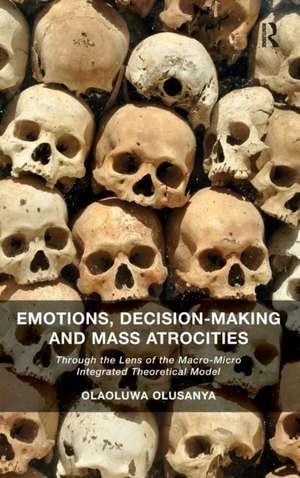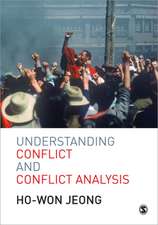Emotions, Decision-Making and Mass Atrocities: Through the Lens of the Macro-Micro Integrated Theoretical Model
Autor Olaoluwa Olusanyaen Limba Engleză Hardback – 2 iun 2014
| Toate formatele și edițiile | Preț | Express |
|---|---|---|
| Paperback (1) | 255.49 lei 6-8 săpt. | |
| Taylor & Francis – 30 iun 2020 | 255.49 lei 6-8 săpt. | |
| Hardback (1) | 1053.92 lei 6-8 săpt. | |
| Taylor & Francis – 2 iun 2014 | 1053.92 lei 6-8 săpt. |
Preț: 1053.92 lei
Preț vechi: 1285.26 lei
-18% Nou
Puncte Express: 1581
Preț estimativ în valută:
201.67€ • 211.53$ • 167.88£
201.67€ • 211.53$ • 167.88£
Carte tipărită la comandă
Livrare economică 01-15 aprilie
Preluare comenzi: 021 569.72.76
Specificații
ISBN-13: 9781472431035
ISBN-10: 1472431030
Pagini: 160
Ilustrații: Includes 4 b&w figures
Dimensiuni: 156 x 234 x 11 mm
Greutate: 0.43 kg
Ediția:New ed.
Editura: Taylor & Francis
Colecția Routledge
Locul publicării:Oxford, United Kingdom
ISBN-10: 1472431030
Pagini: 160
Ilustrații: Includes 4 b&w figures
Dimensiuni: 156 x 234 x 11 mm
Greutate: 0.43 kg
Ediția:New ed.
Editura: Taylor & Francis
Colecția Routledge
Locul publicării:Oxford, United Kingdom
Cuprins
Emotions, Decision-Making and Mass Atrocities
Notă biografică
Olaoluwa Olusanya is currently a Lecturer at the Department of Law and Criminology, Aberystwyth University, UK. His most recent work has appeared in journals such as the British Journal of Criminology, New Criminal Law Review, Psychiatry, Psychology and Law and Critical Criminology. He is a member of several associations including the British Society of Criminology, British Psychological Society Forensics Division (Affiliate member), British Sociological Association and the Higher Education Academy. He is the author of several books on international crimes.
Recenzii
’This innovative book punches well above its size, weight, and length. Olusanya offers a panoramic survey of the emotions in prompting, industrializing, coping with and, ultimately, transcending mass atrocity. Olusanya reminds us that perpetrators of mass atrocity, however ugly, still remain human. For Arendt, evil may be banal but for Olusanya this banality is the result of cognitive dissonance. This exciting book is bound to cause sparks, open debates, and refresh the field.’ Mark A. Drumbl, Transnational Law Institute Washington and Lee University, USA ’This is an insightful study that combines psychological and social theories to further our understanding of the dynamics of mass atrocities. Scholarly, cogent, and clear, the author brings to the fore the importance of emotions in criminal behaviour, and offers an original contribution to the study of mass violence.’ Majid Yar, University of Hull, UK 'The author’s efficiency and capacity to succinctly and accurately explain the various bodies of empirical research he is pulling together is impressive. As a detailed and multifactorial integration of criminological and psychological findings this book makes a real contribution to the field.' Criminal Law and Criminal Justice Books
Descriere
Within sociology and criminology the dominant view is that genocide and other mass atrocities are committed by technologically-lobotomized perpetrators. Somehow the process of rationalization is believed to have transformed these people from emotionally healthy people into hollow soulless shells of human beings or zombies, devoid of a full range of normal emotions. However it is difficult to imagine crime without emotions. There is, therefore, a need to revisit existing assumptions around the role of emotions in mass atrocities. This book rehumanizes perpetrators of mass atrocities.









